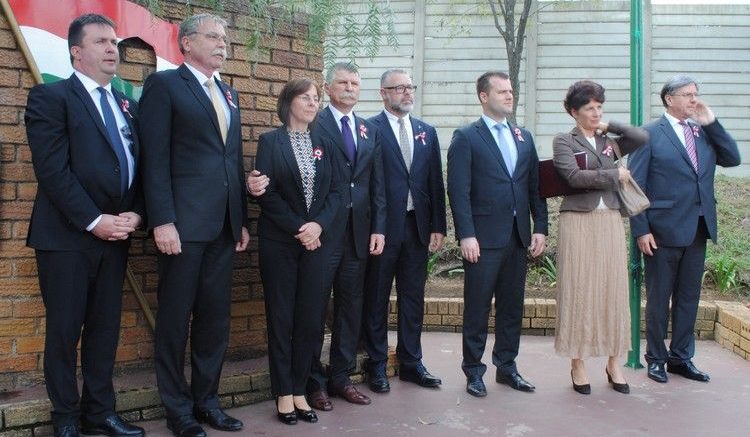|
|
Led by Speaker of the Hungarian Parliament, Dr László Kövér, the delegation included members of parliament, media members and the Commander of the Parliamentary Guard. The delegation visited the South African Parliament in Cape Town, undertook a visit to the eastern coastal entrepôt of Durban, then moved on to the administrative capital, Pretoria.
They also visited the Hungarian Ranch, situated halfway between Pretoria and the financial powerhouse, Johannesburg, to commemorate the country’s remembrance of the Revolution and Independence War of 1948-9.
It all began on March 15, 1848. Starting on that day, Hungary, in one of history’s great constitutional triumphs, went bloodlessly from feudalism to democracy. This angered the Absolutist Hapsburg king of the country and emperor of the Austrian Empire. (A link to a brief history of the war can be found here.)
The Austrian leaders saw Hungary as a subject kingdom, even though Hungary is older than Austria, so they tried to crush the peaceful revolution. This led to the war, where the young Hungarian democracy defeated Austrian Absolutist forces but was eventually overcome by Russian intervention.
The Speaker also laid a wreath to commemorate the heroes of the Hungarian Revolution of 1956 as he said it was unlikely he would be back at the Hungarian Ranch on October 23.
The freedom fight of 1848-9 was fought against an oppressive power by a people and a country which by then had lost its independence for the past 300 years. Freedom and national identity have always been held very dear by Hungary and the Hungarian people. Hungarians were always prepared to take up arms for it, even when their homeland had to be protected against an enemy who was more powerful than themselves. The 15th of March, 1848, teaches us an important lesson, namely, that we must stand up for our rights, even if we know and anticipate that we may be defeated, because the secret to Hungarian freedom is this: If Hungarians genuinely believe it, if they stand up for it, their fight will prove victorious, even if defeated.
Besides remembering 1848 and the Hungarian Uprising of 1956, the visitors shared an excellent traditional lunch of Gulyás Soup and pork “paprikás,” with dumplings, followed by Gerbeaud cake and coffee and there were the usual speeches and greetings, including one by the Ranch president, László Pleskó.
What’s more, we were able to buy some home-made Hungarian “kolbász” (spicy sausage) from chef László Dóka.
For us, Hungarians and children of Hungarians, living here on the southern tip of Africa, a visit by such a high powered delegation was truly remarkable, as Hungary has not been very good to its far-flung ”children.”
During the Communist Era (1947 to 1990) the Secret Police, first the feared ÁVÓ (State Securtiy Authority)
They also sent spies to Hungarian expatriate communities around the world who often worked on breaking up these communities. One sent to South Africa was picked up in the 1970s, much to our shock, as he had been a popular youth leader!
Then, when Communism “fell” in 1990, we naïve overseas Hungarians thought we would now all be friends and basically all would be well. Not so. It took me years and years to finally get a Hungarian passport (both my parents were Hungarian) and it even became a political issue over there.
In what is likely the most shocking and brutal rejection of compatriots, Hungary’s ex-Communist left-wing coalition in 2004 campaigned against the restoration of citizenship to Hungarians in neighbouring countries. These people had been cut off from Hungary in 1920 by the post-war treaties and millions lost their Hungarian citizenship, without moving an inch.
Fortunately, the Hungarian electorate later resoundingly rejected these parties, with incidents of MSZP (Hungarian Socialist Party) members being “whistled out” (the equivalent of being booed) in cities in the present-day Slovakia, Rumania and other Successor States of Hungary.
Hungarians who fled Nazism or Communism had also been deprived of their citizenship (unless the powers that be wanted one in prison) and there was no chance of this being put right until the new citizenship law of 2010, which went some way to rectify this injustice.
So, perhaps understandably, when Hungarians “beyond the borders” meet “official” Hungary, we are just a little bit leery. These days we at least know they don’t want to assassinate, kidnap us or spy on us, nor are they rejecting us (then they wouldn’t come, would they?) But of course, they want our votes. Well, it could be a lot worse!
And after having informal chats with the speaker, the guard commander, a media officer and one of the M.P.s, I’d say they’re welcome back anytime!






